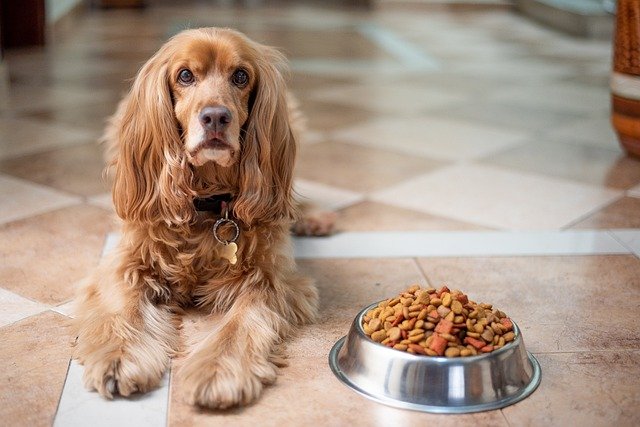Homemade dog food can help your dog in a variety of ways, especially if he or she has allergies, skin issues, or gastrointestinal sensitivities.
In addition, highly processed foods lose nutritional value during the heating process, but creating dog food from scratch preserves more critical nutrients. Rather than reading the label and being confused by all the additives and preservatives, you can know precisely what your dog is getting with fresh food and the best is Homemade Dog Food that will keep your dog healthy and happy.
Having said that, perfecting homemade dog food might take a long time and work. All of the nutrients that your dog requires to be healthy must be included in homemade dog food, but they must be present in the correct amounts so that your dog does not receive too much or too little of any nutrient. A veterinary nutritionist has specialized knowledge to assist pet parents like you in preparing nutritious meals for your dog. With this purpose in mind, our veterinary consultant has reviewed all of the recipes in this post.
If you run out of dog food, it’s a good idea to keep the recipes in this article on hand. Prepare nutritious meals from reliable ingredients for your dog like you would for any other member of your household.
What Dietary Recommendations Should You Follow?
Every dog is unique, just like humans, so this isn’t supposed to be a one-size-fits-all rule. When deciding what’s right for your dog, consider the serving size, your dog’s weight, health issues, size, and activity level.
Water, protein, fat, carbs, minerals, and vitamins are the six basic elements that dogs require to maintain a healthy, balanced diet. A combination of these nutrients gives your dog’s body the energy it needs to digest and thrive.
You may also want to supplement your dog’s diet with a multivitamin to ensure that he receives the recommended vitamins and minerals.
Before adding any form of supplement to your dog’s food, consult your veterinarian because excessive vitamin and mineral supplementation in dogs can have major health repercussions.
Nutrients Required
Here are the advantages of each of the essential nutrients, as well as why it’s so vital for your dog to have enough of each (listed in order of priority).
• Protein (chicken, lamb, turkey, beef, fish, and boiled eggs) – Aids in the cell, tissue, organ, antibody, hormone, and enzyme growth and maintenance.
• Fat (from meat and oil) – Helps with vitamin absorption, protects and insulates internal organs, and promotes healthy skin and hair growth.
• Carbohydrates (rice, corn, and beans) — Maintains the health of the intestines and delivers glucose to vital organs, such as the brain.
• Vitamins A, B, C, D, E, and K — Supports eye and skin health, as well as immunity and other functions.
• Minerals, such as calcium, potassium, sodium, magnesium, iron, zinc, and other trace elements — Among other things, it gives dogs healthy bones and teeth.
Water makes up 60-70 percent of a dog’s body weight, so keeping him hydrated is essential, as is feeding him a well-balanced meal. Dehydration can cause a variety of health problems, so make sure your dog has unlimited access to clean, freshwater throughout the day.
Consult your veterinarian before beginning a homemade meal plan to ensure that your dog’s diet satisfies all of his nutritional requirements.
Recipes for Low-Calorie Dog Food
Stew of Beef
Stew of Beef
This meal is high in iron from fresh protein and may be kept in the refrigerator for up to a week (or frozen and heated up later).
1 pound beef stew meat
1 small sweet potato
1/2cup carrots, diced
1/2cup green beans, diced
1/2 cup flour
1/2 cup water
1 tablespoon vegetable oil Ingredients
Total: 4 cups (about) (32 fluid ounces)
Nutritional Information (per 1 cup): 301 calories
Minerals & Vitamins: Vitamin D, Calcium, Iron, and Potassium
• Protein: 36.7 g
• Fat: 8.4 g
• Carbs: 17.4 g
• 4.3 g fat,
• 4.7 g carbs
The mixture of turkey, rice, and vegetables
The mixture of turkey, rice
The mixture of turkey, rice
This is a great low-calorie and low-fat recipe for dogs that are trying to lose weight. It makes 12 cups of dog food and maybe refrigerated for up to 5 days with a balanced balance of lean animal protein, nutritious carbs, and vegetables.
Nutritional Information (per 1 cup):
• 97 calories
• 11 g protein
• Iron, Potassium, Minerals & Vitamins:
Biscuits for Dogs with Pumpkin
Biscuits for Dogs with Pumpkin
Are you seeking a digestive aid for your dog? Hence, Pumpkin is gentle on sensitive stomachs and can improve your dog’s digestive problems. These all-natural dog biscuits are a terrific way to add a natural belly aid to your pup’s diet.
Nutritional Information (per 1 biscuit):
• 27calories
• Protein: 1.3 g
• Fat: 1.5 g
• Carbs:2.8 g
• Minerals & Vitamins: Vitamin D, Iron
Banana Treats Frozen
Banana Treats Frozen - dog food treat
What dog wouldn’t appreciate a chilly treat after a long walk in the scorching sun? This easy combination of yogurt, banana, and peanut butter is one of our favorites. It’s a frozen smoothie made especially for your dog. Is there anything further to say?
Nutritional Values (per 1 treat):
• Calories per serving: 150
• Protein: 8.5 g
• Fat: 3.7 g
• Carbohydrates:19.5 g
Minerals and vitamins: Calcium, Potassium, Iron Because every puppy is different. We strongly recommend that you first discuss your dog’s individual nutritional needs with your veterinarian. Remember that transitioning your dog’s diet from kibble to homemade takes time, so be patient.
